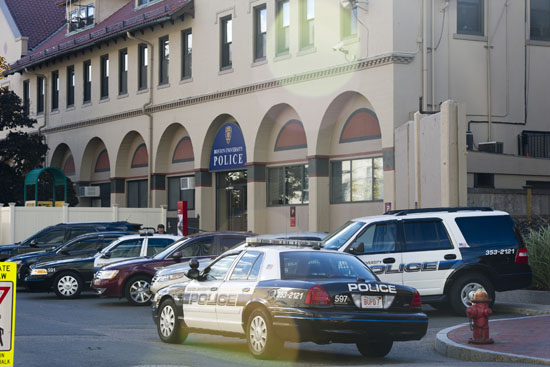Our annual alert about BU’s alcohol enforcement
BU's alcohol enforcement patrols return

Last year’s array of alcohol enforcement strategies remains unchanged for the 2014–2015 academic year. Photo by Cydney Scott
Roughly 80 percent of the Class of 2017 drinks moderately or not at all, according to class members’ responses to an online alcohol course and survey mandated by BU. But for those who don’t practice moderation, the University’s enforcement of drinking laws, including increased police patrols of party neighborhoods off campus, will continue this academic year.
“At this point, I see our alcohol enforcement strategies consistent with what we did last fall and spring,” says Captain Robert Molloy of the Boston University Police Department. The enforcement started last weekend; seven students were transported to the hospital for acute intoxication.
In an email sent out to BU staff, faculty, and students earlier this week, Thomas Robbins, BUPD chief of police and executive director of public safety, wrote that the additional patrols are designed in part to monitor “off-campus gatherings to curb dangerous drinking, underage drinking, and other activities that are unlawful and potentially dangerous.”
The University and local police began three years ago increasing patrols of party-heavy neighborhoods, breaking up loud gatherings, and publishing weekly enforcement stats on BU Today in an effort to quell alcohol-fueled rowdiness.
The strategy, similar to one that reduced off-campus drunkenness at the University of California, has won plaudits from residents near campus for curtailing loud parties. David McBride, outgoing director of BU’s Student Health Services, says research shows UC’s initiative did not drive excessive drinking to less-policed locations, but actually curtailed it.
Many students have objected to the enforcement as a futile waste of time and money, but others tout it as countering unhealthy behavior. “I think it makes students more conscious of their alcohol-related decisions on campus,” says Daniel Nielson (SAR’14), who worked this summer as an intern in BU’s Wellness and Prevention Services. “I think it has helped to keep the student body safe and healthy in recent years.”
Last winter, the BUPD got an early jump on its usual spring increase of patrols following a spike in alcohol-related hospital runs among students.
According to Officer Peter Shin of the BUPD Crime Analysis Unit, 153 students went to the hospital for acute intoxication last year, down from 170 the previous year and 250 in the 2010–2011 academic year.
Local municipal police are also revving up for fall parties. “We will continue to enforce underage drinking laws, as well as public drinking laws,” Boston Police Sergeant Michael McCarthy says. In February, four BU students spent three nights in jail after throwing two loud parties in Allston, violating a judge’s order after the first bash that they cease hosting guests.
The enforcement also includes educational efforts. The BUPD will distribute brochures to students living on and off campus that outline Massachusetts drinking laws and the penalties for defying them, as well as safety tips and the BUPD contact info, 617-353-2121, or text tip411 (847411): BU <space> location and description of your emergency.
The dangers of excessive drinking—trips to the emergency room, impaired academic performance, greater vulnerability to assault—have been staples of President Robert A. Brown’s summer letter to parents of incoming students and of his Matriculation speeches.
On another tack, the University is repeating a requirement initiated last summer that first-year students take AlcoholEdu for College, an online course dispelling myths about campus drinking that might encourage alcohol abuse.
BU Today will publish each weekend’s enforcement stats on the following Thursday through mid-November.
Comments & Discussion
Boston University moderates comments to facilitate an informed, substantive, civil conversation. Abusive, profane, self-promotional, misleading, incoherent or off-topic comments will be rejected. Moderators are staffed during regular business hours (EST) and can only accept comments written in English. Statistics or facts must include a citation or a link to the citation.